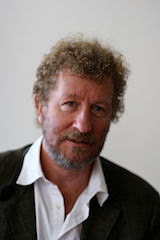“Poetry
is, first and last, language - the rest is filler.”
– Mark Strand
Canadian-born (on Prince Edward
Island where Anne of Green Gables was
set), Strand eventually studied in America and became an American citizen where
he had a distinguished career as a poet, essayist and translator. He died in 2014 at age 80.
In 1990 Strand was appointed Poet
Laureate Consultant in Poetry to the Library of Congress and in 2004 he
received the Wallace Stevens Award, given to "recognize outstanding and
proven mastery in the art of poetry.” The
Stevens also
– which makes it the
richest prize in poetry unless a poet happens to win the Nobel Prize.
Which is not to say he didn’t do
well in the awards department. Strand
received numerous prizes for his work, including a MacArthur Fellowship (The
“Genius” grant) in 1987, and the 1999 Pulitzer Prize for Poetry, for Blizzard
of One. Known for his highly personal touch, he said "Pain is filtered in a poem so that, in the end, it becomes pleasure."
Here, from Blizzard of One is Saturday’s Poem:
The Everyday Enchantment of Music
A rough sound was polished until it
became
a smoother sound, which was polished until
it became music.
Then the music was polished until
it became the memory of a night in Venice
when tears of the sea fell from the Bridge of Sighs,
which in turn was polished until it ceased
to be and in its place stood the empty home
of a heart in trouble.
Then suddenly there was sun and the music came back
and traffic was moving and off in the distance,
at the edge of the city, a long line of clouds appeared,
and there was thunder, which, however menacing,
would become music, and the memory of what happened after
Venice would begin, and what happened
after the home of the troubled heart broke in two would also begin.
a smoother sound, which was polished until
it became music.
Then the music was polished until
it became the memory of a night in Venice
when tears of the sea fell from the Bridge of Sighs,
which in turn was polished until it ceased
to be and in its place stood the empty home
of a heart in trouble.
Then suddenly there was sun and the music came back
and traffic was moving and off in the distance,
at the edge of the city, a long line of clouds appeared,
and there was thunder, which, however menacing,
would become music, and the memory of what happened after
Venice would begin, and what happened
after the home of the troubled heart broke in two would also begin.
Share A Writer’s Moment with a friend by clicking g+1 below.









